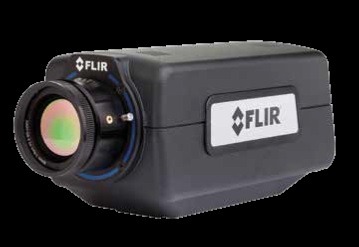
FLIR’s A6750sc SLS thermal imaging camera offers the high speed, high resolution, ease of use and flexibility in configuration for optimally detecting high-speed thermal events and fast-moving targets.
The camera incorporates a high-performance cooled Strained Layer Superlattice (SLS) detector that operates in the 7.5 to 9.5 micron waveband -producing crisp LWIR thermal imagery at 640x512 pixel resolution.
Working in snapshot mode, the FLIR A6750sc SLS can capture all pixels from a target simultaneously in less than 190 microseconds for room temperature scenes.
This is particularly important when monitoring fast-moving objects, such as in impact testing experiments - where an uncooled thermal imaging camera would suffer from image blur.
The camera supports image frame rates up to 4.1k frames per second when operating in windowing mode.
With data capture over a wide temperature range up to 2000°C the FLIR A6750sc SLS is designed to be readily synchronised with other instruments and events. Custom cold filtering options for specific spectral detection and measurement are available.
Using a standard GigE Vision interface to transmit full dynamic range digital video, and GenICam for camera control, the model is designed to be a true ’plug and play’ thermal imaging camera. Additional interfaces include a BNC analogue video output.
The Gigabit Ethernet and analogue video are simultaneously active yet independently-controlled, allowing greater flexibility for recording and display purposes.
Using FLIR’s ResearchIR software, researchers and scientists can monitor, acquire, analyse, and share data. In addition, extender rings for zoomed-in fields of view make the camera perfect for imaging small thermal targets, and close-up lenses can detect spot sizes down to 15um per pixel – well beyond the capabilities that lower performance IR cameras are able to achieve.




